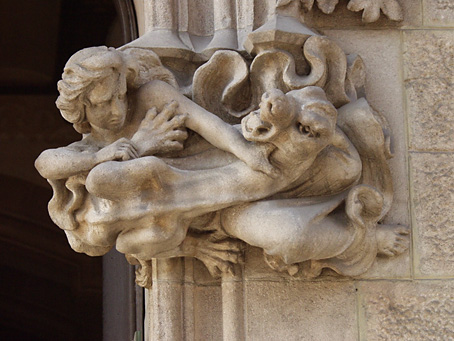Greater Amalek

“Now when the thousand years have expired, Satan will be released from his prison and will go out to deceive the nations which are in the four corners of the earth, Gog and Magog, to gather them together to battle, whose number is as the sand of the sea.” Revelation 20:7-8
“[Revelation 20:7] tells us that the Millennium, which began 40 years after Jesus’ ascension, will not last all the way to His second coming. There is a brief period of time after the Millennium in which Satan will once again be released from the Abyss. Once again he will deceive the nations, Gog and Magog (prince and people; Ezekiel 38-39), to attack the Church. This final assault will be cut short by fire from heaven and the Last Judgment.”1
The allusion to Gog and Magog brings us to Ezekiel 38-39. Satan is Haman (head), ejected from the Emperor’s court but still desiring to destroy the people of God by deceiving the nations (body). The Lord, however, has prevented him from carrying out that plan. David Chilton writes:
“The stated goal of the Dragon’s deception is to entice the nations to join forces against Christ for the final, all-out war at the end of history. Satan’s desire from the beginning has often been to provoke a premature eschatological cataclysm, to bring on the end of the world and the Final Judgment now. He wants to rush God into judgment in order to destroy Him, or at least to short-circuit His program and destroy the wheat with the chaff (cf. Matt. 13:24-30). In a sense, he can be considered as his own agent provocateur, leading his troops headlong into an end-time rebellion that will call down God’s judgment and prevent the full maturation of God’s Kingdom.”2
Not only does this identify Satan as the true Amalek, surrounding the camp of the saints as he did in Exodus 17, and the beloved city as he did in Ezekiel 38, it also identifies this Conquest period of the greater Bible pattern with the Book of Esther. It is the time of God working unseen in the affairs of mankind, masterfully orchestrating all events for His ultimate purpose. After all, the kingdom of God is like leaven hidden in dough (Matthew 13:33). It is this process Satan would wish to stop.
The “binding” does not mean Satan has no influence in the world. He was bound in one aspect of his “ministry”, that of deceiving the nations. He is unable to mount another “universal” attack—a conspiracy of nations—against the church until he is released.
Finally, Satan is loosed again. And what does he immediately do? As He did in the late 60′sAD, he AGAIN gathers a conspiracy of nations against the church, this time on a world-scale. And what does this attack do AGAIN? It brings about the end of the age and a resurrection – this time on a world-scale. The second resurrection and the final judgment.
So, hyperpreterism misunderstands and truncates this entire process back into the first century. But this limits the conquest of Christ to Garden and Land. Jesus is now conquering the World. As Greater Amalek, Satan is powerless to gather the nations as “the sand by the sea”, while Jesus, as Greater Solomon, has been given all power to do so.
“Judah and Israel were as numerous as the sand by the sea in multitude, eating and drinking and rejoicing.” 1 Kings 4:20
______
1 James B. Jordan, The Vindication of Jesus Christ, p. 84-85.
2 David Chilton, The Days of Vengeance, p. 504.






























